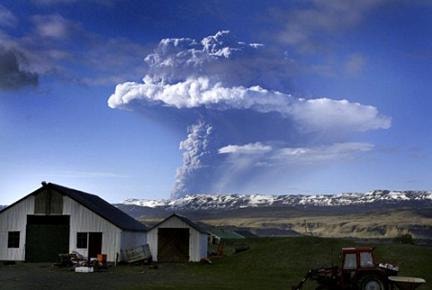Iceland volcano erupts, concerns for flights
Iceland's largest subglacial volcano, Grimsvoetn, began erupting last night, sending a huge plume of smoke rising from its crater.
"An eruption has started at Grimsvoetn, a plane is on its way there to assess the situation," said Haraldur Eirkisson, an official at the Icelandic Meteorological Service.
"There was a big cloud rising from Grimsvoetn at around 19:00 GMT, and an hour later the plume was 11 kilometres high," he added to AFP. After two hours, the plume was 20 kilometres high.

Smoke rises from Grimsvoetn volcano last night. Photo: AFP
Grimsvoetn is Iceland's most active volcano, erupting nine times between 1922 and 2004. It lies beneath a large ice sheet in the southeastern part of the Icelandic island nation, in the North Atlantic.
Last year, the eruption of Mount Eyjafjoell, southwest of Grimsvoetn, forced several European countries to close their airspace for nearly a month, due to concerns that volcanic ash could damage aircraft engines.
It is not yet clear whether the new eruption will release sharp ash particles into the air like last year. Officials from Iceland's meteorological agency said the ash was not widespread, just above the volcano, and they could not yet say whether it would affect air traffic.
Speaking about the Eyjafjoell volcanic ash last year, Susan Stipp, professor of nanoscience at the University of Copenhagen, explained; "Those ash particles are the result of hot magma colliding with cold water/ice, which makes the particles very, very small."
"Because they are so small, they fly high and far. They are also very sharp, and will be dangerous for the windows of the plane. When they collide, the plane will be like being sanded. Even more dangerous is that the small particles can melt when they get inside the engine, causing an engine fire."
What is worrying now is that the recently erupted Grimsvoetn volcano is also under a large ice sheet measuring 8km in diameter. When it erupted in 2004, ash drifted across mainland Europe and caused delays or cancellations to some flights to and from Iceland. Geologists have been predicting an impending explosion inside the volcano since last year, after observing a large river flowing from the melting ice.
According to VnExpress






